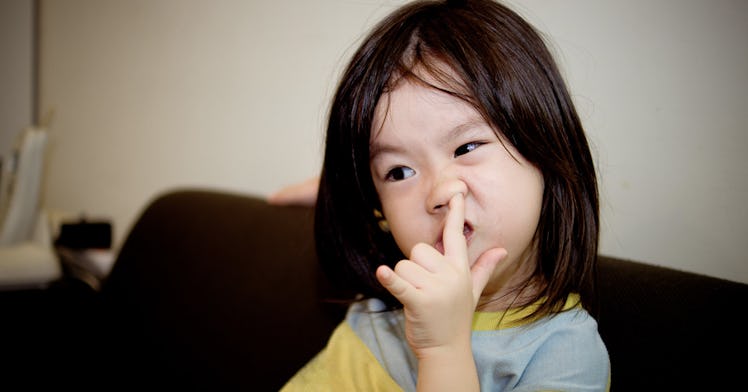How To Get A Kid To Stop Picking Their Nose (If You Must)
The best way to fight nose picking is to ignore it and let peers pressure it out.

Watching a kid knuckle-deep in a nostril digging for gold is pretty gross. Grosser still is contemplating the fact that you don’t know where the mucus is going to end up and to what degree your house is laminated in the stuff. Given that, it’s no wonder that parents are often so determined to make the habit go away. Interestingly, the path to pick-free progeny presents itself as a kind of Buddhist koan: To get a kid to stop picking their nose, stop trying to get them to stop picking their nose.
That might cause a certain amount of anxiety for some parents, who may be silently screaming: Isn’t it bad for their health!? Well, no. Not actually. In fact there is very little evidence that nose picking is harmful unless it’s connected to profound and very rare psychological conditions like a desire to eat the inedible (pica) or pathological nose-picking (rhinotellexomania). Parents can rest assured that nasal non-interventionism doesn’t put kids at risk. It does, however, threaten the bottom of couch cushions.
One method of stopping a picking problem is by helping a kid develop an appropriate way to pick their nose (in a private bathroom, with washed and dried hands and only after blowing their nose). “If needed, they gently remove any remaining offending mucus with a tissue and wash and dry hands again,” explains Psychiatric Nurse Epidemiologist J. Lucy Boyd, who knows from such things.
One of the reasons the method works, explains Boyd, is that it fights a child’s desire to do something forbidden. Also, the bathroom nose-picking requirement is complicated and frankly not worth the effort. “The child will stop doing it out of habit as it is too much trouble to keep doing it,” Boyd says. “But they will be able to remove mucus when needed.”
And quite honestly, it is sometimes, definitely needed.
While going to the bathroom does put the behavior out of sight marriage and family therapist Joanne Newfield believes that it’s even better when put out of parents mind through “selective attention” a.k.a. Ignoring.
“When we ignore negative behaviors, we are actually correcting them,” Newfield explains. “Children have negative attention seeking behaviors since they are looking for their parent’s attention or a reaction from them.”
But it’s not all about simply turning a blind eye. Kids should understand ahead of time what’s going to happen. They need to be on the same page and understand that they’re not going to get the attention they so crave when they jam their pointer finger brainwards.
“Parents should then focus on what their child is doing right, and praise them for it,” Newfield says. That might include going to pick in the bathroom or blowing comically and loudly into a tissue—whatever is agreed upon as a better way. “Children will soon realize that they get their parents attention for positive behavior, not negative behavior like picking their nose.”
Psychiatrist Dr. Denise Dixon of Suffolk Health Psychology Services lays out the steps succinctly: Understand when the behavior is most likely to happen and figure out the best replacement, or “positive opposite.” Then, parents can zero in their praise to make it the most effective.
“The game plan is to set a timer for at least 10 minutes after selecting the most problematic time of day that the undesirable behavior occurs,” Dixon says. “Every time that that child demonstrates the positive opposite, the parent is going to lavish praise that is specific, enthusiastic, and includes touch.”
A high five or hug, for instance, will work just fine here. Particularly because their hands will be free of boogers.
“It works magic,” says Dixon.
This article was originally published on